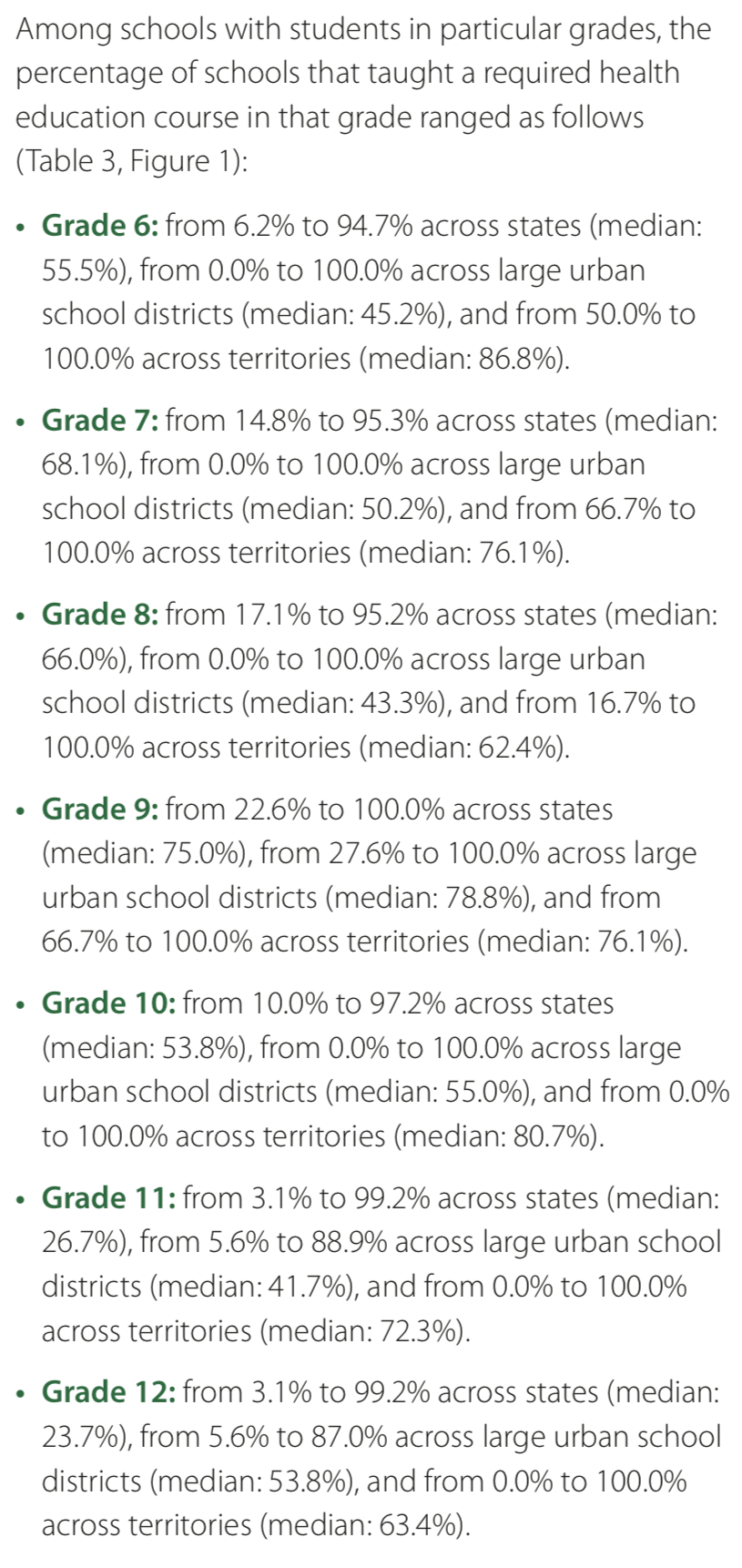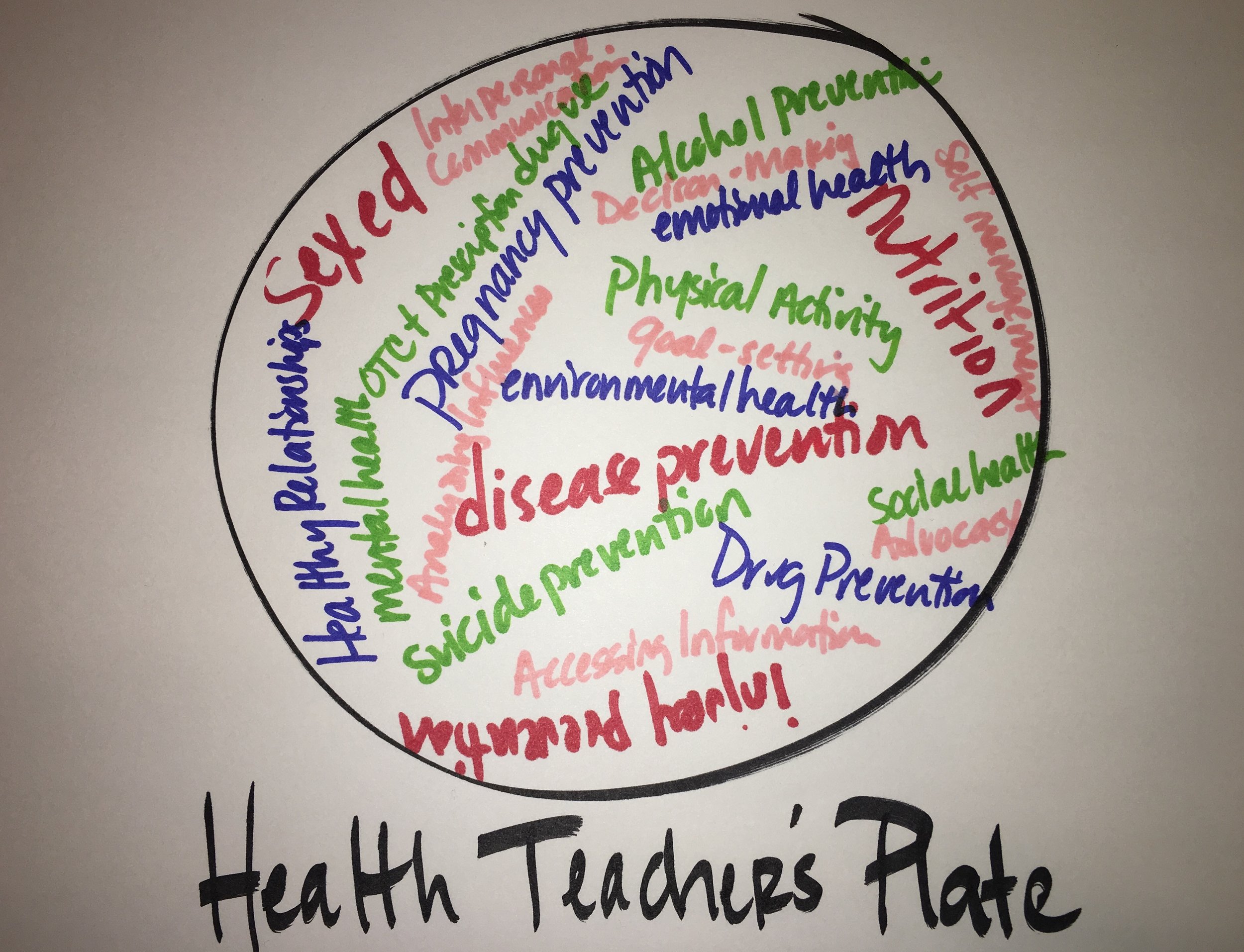With so little time to teach health education and so many content areas being added annually, health education instruction is not as not as effective as it could be. Meth bills, opioid bills, bullying prevention bills… is that really the answer? Putting more pressure on health teachers to teach more content?

From School Health Profiles, page 11
Let me be honest… students are getting severely minimal health education to begin with. Like, embarrassingly small amounts of time focusing on one of the most important areas of one’s life- health & well-being. According to Centers for Disease Control and Prevention School Health Profiles Survey, there is a large discrepancy of secondary schools that taught a required health education course 6th-12th grades. Some states do not require a credit in health education for graduation and many middle school students receive less than 9 weeks of health education throughout their middle school tenure.
As more and more state bills are introduced to intervene on public health crises, more content is added to the health teachers’ plate. A plate that is typically full to begin with since there isn’t enough time allotted to the content area.
To add to the lack of time for health education, many health teachers are not highly qualified/certified and in some cases, the science or PE teacher is asked to teach health, whether or not they have a degree or certification in the area. Non-qualified teachers teaching health are less likely to teach certain subjects (lack of comfort or knowledge on finding strong materials & resources) and many have not had training in answering difficult questions, skills-based health education pedagogy and the evidence-based practices in the field.

A health teachers plate- over 10 content areas and 7 skills (in pink).
Teaching a 2 day unit on promotion of healthy eating to expect that students gain the functional information and skills they need to eat breakfast everyday, select nutrient-rich snack and meals, drink water, eat fruits and veggies is not realistic. A math teacher doesn’t spend two days on the addition unit and move on. There is a logical progression and application over time that is integrated in through hours of study. Health education should consist of units that are taught specifically to address concerning data points of student health behavior and to help support the maintenance of health promoting behaviors. Meaning, 2-day units aren’t going to cut it. But, if you haven’t had strong professional development in the content area and you aren’t even a certified health teacher, you might not know that isn’t effective. Units should be a couple weeks in length and I believe they should be more focused on skill-building than content anyway. Most legislative bills focus on content without any specific skill-building aspects aligned to health education.
I’m not saying passing legislative bills isn’t the way to go. It really is a great opportunity. But, I’d like legislators and even public health content specialists passionate about addressing a public health crisis to understand health education pedagogy and the National Health Standards of which ONE is content specific, and SEVEN are skills-based (analyzing influences, accessing information, interpersonal communication, decision making, goal setting, self-management and advocacy).
Bills that legislators might introduce that will help health education, and therefore prevent drug use and other public health crisis might have language that includes something like…
- Comprehensive health education K-12 is taught sequentially through a locally develop scope and sequence aligned to the state content standards and informed by local data driven decisions on adolescent health behaviors. The minimum minute requirements are:
- Elementary School: 45 minutes/week
- Middle School: 90 minutes/week
- High School: 90 minutes/week
- Health education should be skills-focused in which students are spending 75% of instructional time within a course on practicing and demonstrating the seven National Health Education Skill Standards.
- Health teachers should be highly qualified to teach health education.
- Health teachers should have access to content-specific professional development opportunities at least twice a year.
- Health teachers should use research-based curriculum with specific behavioral outcomes to teach health education.
- Health teachers should have access to professional development on creating a trauma-informed classroom while teaching sensitive topics.
- And, then finally- include the functional information that students need to know in order to prevent the public health crisis.
In conclusion, I end with a question… How do we as a field, educate our passionate lawmakers to write bills that are effective and appropriate instead of knee-jerk reactions to an epidemic or event?

Leave a Reply